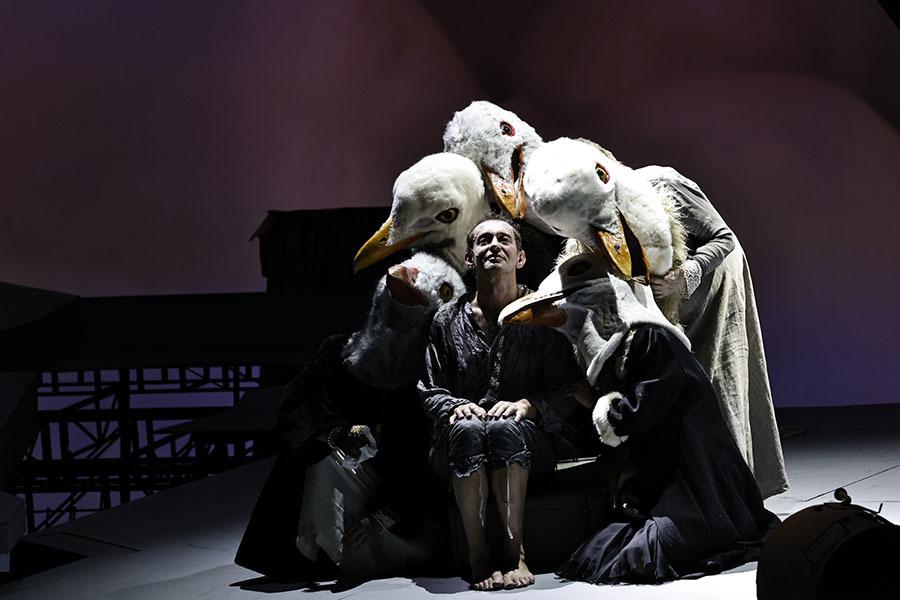On October 16 and 17, on the main stage of the Moscow Art Theater named after A.P. Chekhov played the long-awaited premiere of the play "Vraki, or the Testament of Baron Munchausen". Director Viktor Kramer, in collaboration with Konstantin Khabensky (who is also the leading actor), wrote a play in which fictional and real events from the lives of two Munchausen - a man and a literary character - were intertwined. This is a story about the last day of the life of Karl Friedrich Jerome von Munchausen from Bodenwerder, near whose deathbed the whole family gathered. But the baron turns out to be more alive than dead ...
This year is a jubilee for Munchausen.
In 1781, the first sixteen stories about the baron appeared on the pages of the German magazine "Guide for Merry People".
They were published under the pseudonym "M-H-G-N".
But, of course, the book by Rudolf Erich Raspe, published in 1785, brought true glory to this character.
The authors of the play cleverly create a compilation from several sources about the adventures of Munchausen, intertwining literary and documentary materials.
Not without the cult film "The Same Munchausen".
So, for example, the second wife of the baron (in real life it was a 17-year-old jerk who cheated on her 75-year-old husband) bears the name of Martha (Nadezhda Zharycheva). There is also his adult son (Pavel Filippov), and the lover of his first wife (Artyom Volobuev), and the duke (the brilliant comedic role of Alexander Usov). Actually, they all make up the very “family” that gathered to see off a famous, but such a problematic relative on their last journey.
The scene is a churchyard.
It only seems that on a tilted, rotating platform-iceberg there are scattered parts of the house and its interior: a door, a window ... But numerous backrests from iron beds are like grave crosses, protruding pillars are severe tombstones, a wardrobe sunk in the floor is a wooden coffin.
There is mourning here.
Munchausen, on whom the bridge he built collapsed, is dying.
But as soon as a letter from the writer Raspe appears in this space, and then the author's copies of books about the adventures of the baron, the "dead man" unexpectedly comes to his senses.
His agony will last just long enough to be able to live all his incredible adventures again.
A “loving” family will not argue with a dying person (a will awaits them) and will play along: someone will turn out to be a half of a valiant horse, someone - a bee saved from bears.
The first action is static and rather gloomy (the atmosphere of the funeral, after all).
But it gives the necessary take-off for a real flight (and this is not a figure of speech!), Which will happen in the finale of the second act.
A real theatrical miracle in the spirit of Baron Munchausen awaits the audience.
© Alexander Ivanishin
It is difficult to determine the genre of the performance.
The comic here is intertwined with the lyrical, and the tragic turns into a farce.
Konstantin Khabensky certainly plays the role of his dreams.
He is absolutely organic and free in the image of a baron.
“My Munchausen is perhaps more rigid, more realistic.
This is a person who is a little more divorced or trying to break away from reality, creating his own alternative reality, ”says the actor.
But, according to Khabensky, both his hero and the performance itself are likely to change: “It all depends on the reaction of the audience, which can make adjustments and help us answer the question: did we choose the right motion vector?
The most important thing is to enlist the support and trust of the audience. "
Someone will see in the play a satire for today, a conflict between a person and society, someone - the tragic fate of a lonely person who paints life in the violent colors of his indomitable fantasy.
But no one needs a living Munchausen: people need a legend, a myth that brings income.
Christina Babushkina, who plays Baroness Jacobina von Dunten, Munchausen's first wife, speaks of another obvious plan for this story: “For me personally, this story, no matter how trite it may sound, is about love.
About love for a child, about love for an ex-husband, about selfish love for oneself. "
What story the viewer will see depends only on him.
After all, everyone has their own Munchausen!
And, as the baron himself said, “this is not a fact.
This is much more than a fact.
This is how it really is. "

